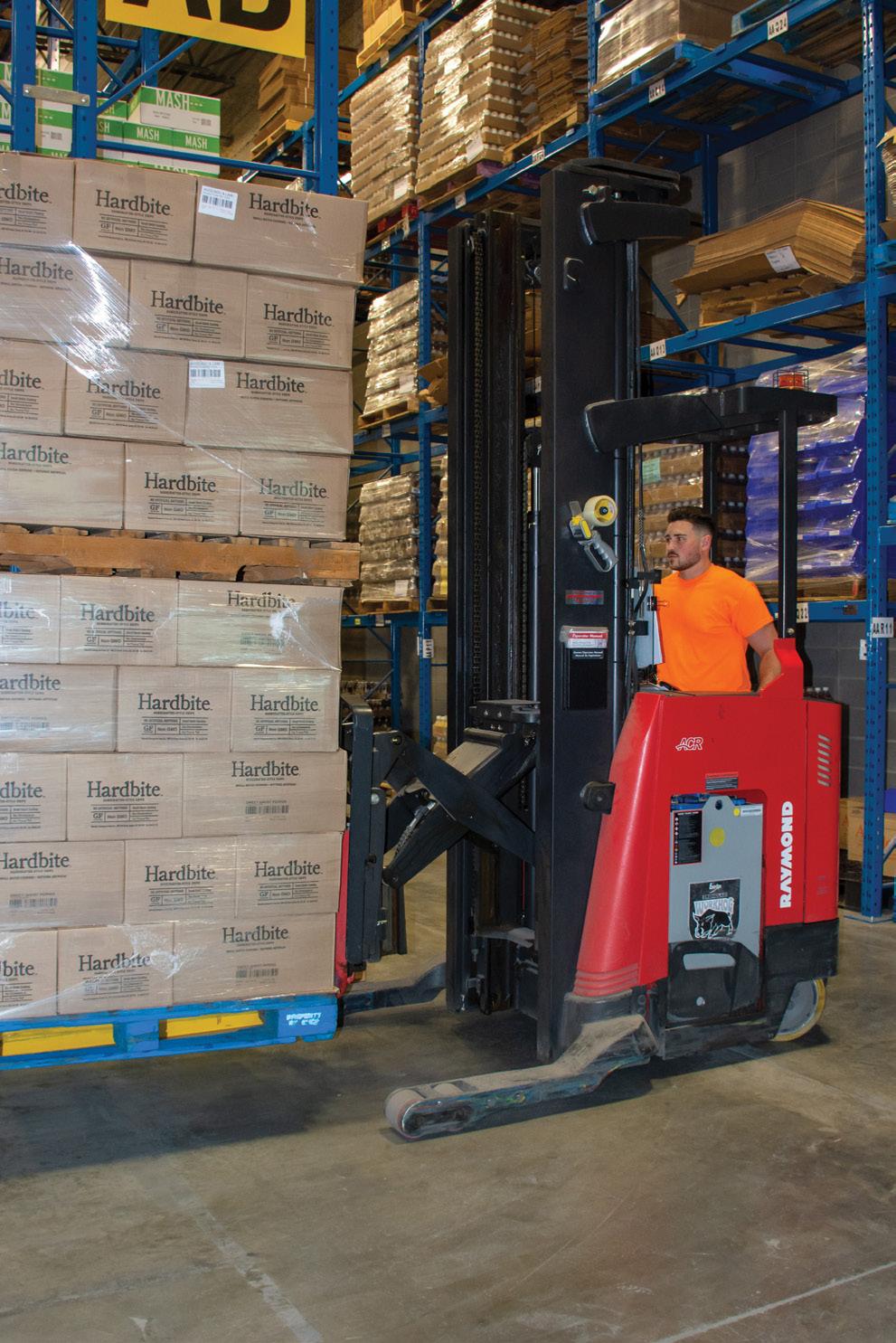
28 minute read
Calgary Chamber of Commerce
The Calgary Chamber is the voice of the business community. We double down on commerce and work with businesses to create catalysts for growth.
A conversation with Murray Sigler, interim CEO, Calgary Chamber of Commerce
Advertisement
In his first few weeks as the interim CEO of the Calgary Chamber, Murray Sigler was struck by two things: how much the role has changed since he last held it in 2005 and the adaptability and resiliency the organization has demonstrated over the years.
“Everything has changed in our lives due to the pandemic, both at home and in our businesses,” reflects Mr. Sigler. “But I am confident in our ability to get through it and be successful in business in this new reality. The Calgary Chamber will be there every step of the way.” In addition to his role as interim CEO of the Chamber, Sigler is also Principal of Calgary-based Altius Corporation, a private investment and consulting firm. He has previously served in executive positions at Axia Net Media Corporation, Canadian Airlines International, Canadian Regional Airlines and the Winnipeg Airports Authority. Sigler also served as Managing Director of the Government of Alberta’s UK Office, and is an honorary lifetime member of the Canada/UK Chamber of Commerce.
With this extensive career in telecommunications, finance and the aviation industry, Sigler has a passion for business and is a strong believer in the Chamber movement. “I have been a member, a sponsor, a Board Director, CEO and now interim CEO,” he says. “The Chamber just keeps getting stronger and I’m thankful for all its done and meant to me in my life.”
Today, the Calgary Chamber represents over 1,300 businesses from every corner of Calgary and across diverse industries including agriculture, technology, oil and gas, manufacturing, finance, commercial real estate, and more. Many of its members are small businesses, the job creators and backbone of the economy.
Sigler will serve as Interim CEO for the Calgary Chamber until a new CEO is found. “My role is to provide a steady hand and I am thankful to the Board and the Chamber team for all of the support and confidence they are showing me,” he says. Uncertainty is Alberta’s challenge and therefore the Chamber’s as well. In the year ahead the COVID-19 pandemic, low oil prices and potential shifts in the political landscape both in Canada and in the United States all further exacerbate uncertainty. “Things are changing every day,” Sigler states. “We don’t know what the future holds, but we can ensure that the Chamber will be there for our business community now, next month and for the years to come.”
Adaptability, agility and relevance will be key to the way the Calgary Chamber delivers essential services to businesses – such as networking opportunities, employee benefits program, and cost savings – the issues and policies it advocates on, and the way events are delivered, which will now require a combination of hybrid or fully virtual delivery. In the short term, the Calgary Chamber will also be focused on its repositioning process. This includes the development of a new strategic direction, which will come from the Board, in consultation with Chamber members and stakeholders, and the search for a new President and CEO. Ultimately, its core strength resides in being a member funded and driven organization, being the Podium of Record and the voice of business in Calgary. Sigler maintains a deep understanding of the role the Chamber plays and brings personal values he’s long held, which were developed through his passion and lifelong commitment to sport. “I have always participated in sport, and incorporated sport initiatives in any professional role I have held,” shares Sigler. “I have played a variety of sports. It’s fun, and it builds strong leadership values that apply to life and especially to business”. During his tenure as Sport Calgary, he oversaw the revitalization of its civic purpose to assist, support, and influence the growth of sport in the city. He fondly recalls the opportunity to transition the role to Catriona Le May Doan last fall, with whom he built a strong professional and personal relationship. Sigler remains involved with Sport Calgary in a volunteer capacity as Board Chair of the Sport for Calgary Foundation.
Throughout his career, Sigler has been active in the community as Board member and Chair of numerous organizations. Currently he serves on the Boards for Parks Foundation Calgary, KidSport Calgary, Lindsay Park Sports Society, and Alberta’s History and Heroes Foundation. He holds degrees in Arts and Law from the University of Alberta and is an active member of the Law Society of Alberta. Sigler is also an alumni of Harvard University’s Graduate School of Business in the Advanced Management program, and an active member of the Calgary Chapter of the Institute of Corporate Directors (ICD). As Calgary, Alberta, and Canada continue to face extreme uncertainty and economic headwinds, Sigler remains confident that our city’s resiliency and adaptability will see it through. “My hope is that I can make a difference in my time here,” he adds. “I do see the delivery of our short-term plan, growth in our relationships with members, and helping the Chamber team tackle issues and grow their careers as the keys to success.”

Small Business Week Calgary

There’s nothing small about it!
Small business week pays tribute to you, the wearer of many hats, the up all nighters, the not knowing and figuring it outers, the job creators and economic contributors. This year we are mixing things up and taking Small Business Week virtual. While 2020 has cancelled a lot of things, it can’t cancel the grit and determination of Small Business Owners! This year Small Business Week is running in a fully digital format with various activations happening throughout the week. The entire week runs from October 19-23, 2020. Find the full schedule of the week and sign up for workshops, networking sessions and more at https://www. calgarychamber.com/sbwsummit.

The highlight of the week will be the Small Business Week Summit, a virtual experience designed to engage and inspire. John Winsor, CEO and founder of Open Assembly, is an entrepreneur, thought-leader and global authority on open innovation, will kick off the summit with an engaging keynote address. Focusing on future of work, learning, and digital disruption, John will inspire you to think big while challenging the status quo. Happening from 10:00 am - 4:00 pm on October 22, 2020, we will transform your home office to an inspired learning experience!

Tickets are on sale now and can be purchased at www.calgarychamber.com/sbwsummit. Small Business Week is all about celebrating the grit and resiliency of entrepreneurship. While this year may look a little different, we will still gather (virtually), learn, connect and grow.
In a City Where Beef is King, Caesar’s Steakhouse is a Calgary Institution

RESILIENCY IS THE KEY SMALL BUSINESS LOOKS AHEAD

BY JOHN HARDY
Wikipedia says it best! “re·sil·ient /rə’zilyənt/able to withstand or recover quickly from difficult conditions.” It is the story of business---particularly small business---in Calgary.
Although big business usually gets the most media exposure and consumer perception, the solidly documented and undisputed fact is that the Canadian---and Calgary--- economy is driven by small business. “Small businesses are the backbone of our economy and our job creators,” says Murray Sigler, interim CEO of the Calgary Chamber.
Widely acknowledged economy stats resoundingly show that there are more than 1.2 million small businesses (with fewer than 100 employees) in Canada. The Alberta and Calgary-specific numbers underscore an even greater

impact of small business. It is more than 30 per cent of the Alberta’s GDP and, in Calgary, it is a vital fact of almost every business sector.
Overview ofthe Program:


Requirements: Apply Now!
The Canadian Federation of Independent Business (CFIB) underscores the need for a small business boost to support the resiliency and the post-COVID bounce-back of small businesses. “It’s critical to our neighbourhoods and, more generally, to Canada’s economic recovery that we move the needle on small business recovery and help businesses who have been starved of sales survive,” said Laura Jones, executive vice-president at CFIB.
Seven out of ten business owners are worried that customers won’t come back and many still struggle to pay bills. About half of businesses across Canada are fully open, but only one in three are at normal staffing levels and one in five are making normal sales, the CFIB says.
While the broadside of the past six months had no silver lining for any business (with the exception of Plexiglas, mask and hand sanitizer manufacturers) the core of the Calgary business community is answering the call about resiliency, moving forward and readying for 2021.
“Our economic recovery will depend on their ability to adapt and reinvent, as only entrepreneurs can,” Sigler added. “It’s a key reason why Calgary’s dynamic and popular Small Business Week (SBW) 2020 was re-designed to empower small businesses to adapt and reinvent.” For obvious COVID and disrupted economy reasons, last month’s SBW was re-purposed from a full trade show to a completely virtual experience.
“The focus was on business resiliency and digital commerce,” he said. “Traditionally Calgary has had one of the largest Small Business Week celebrations in Canada but this year was very different as Calgary and chambers across Canada continue to cope with COVID-19.”
Is your business prepared for a disruption?
As we have experienced with COVID-19, disasters can strike without warning. If you have a continuity plan, your business will be in a better position to respond and get back up and running in no time. Visit calgary.ca/readybusiness to create, review or improve your business continuity plan.
Come in we’re OPEN
Come in we’re OPEN
The six awards presented on September 14 (slightly past press time for this issue of Business in Calgary) recognized some Calgary businesses who had showed resiliency, compassion and determination during COVID-19. The ATB Community Impact Award, determined by a public vote, was given to the business who has made the largest impact in the community during COVID-19.
Sigler detailed that that the goal of the Chamber’s 2020 event was to emphasize resiliency and recognize businesses that have pivoted to remain operational through the health crisis and the lockdown. “Resilient businesses have the ability to rapidly adapt and respond to business disruptions,” he noted, “as well as safeguard people and assets, while maintaining continuous business operations.”
Just a year ago, in understandable contrast, Calgary’s SBW celebrated the gung-ho success of several Calgary small businesses like Routine Cream the 2019 ATB Small Business of the year; Power Properties, the BBB Ethical Business Award winner; and Helcim, the Innovation Award winner.
“This is the time when Calgary small businesses must innovate, innovate and innovate,” says Pippa Blair, the highenergy co-founder of the Calgary-based Routine, the popular and successful manufacturer of natural cream deodorants and other personal care products like face oils, natural shampoos, conditioners, perfumes and soaps now sold in 2,500 locations around the world. “Small businesses should focus on what is needed, not adding to an overcrowded space. Pay great attention to the modern way that people want to receive products and services.”
Neige Blair, Routine co-founder and Pippa’s sister-in-law emphasizes timing for small businesses. “Resistance in these times is to business’ detriment. It is important to look at what people want right now. This is the time for effective products and services, less waste, social responsibility and a general awareness of what is important to consumers. Consumers want to feel heard and listened to.”
Pippa highlights some key aspects of small business resilience and success. “Ideally, it should be a product or a service people actually need, as well as genuine

originality. And, of course it’s important to be aware of your competition, but it’s also important to always be one step ahead. If you are too focused on the competition, you’re always trying to play catch up.
“Platforms have changed, we’ve changed. Change is vital. Resilience is important but businesses must be agile and nimble. Setting strict five-year plans can prevent changing ideas and innovating. A key to small business success is a need for fluidity within strategic planning.”
According to Nicolas Beique, founder of the Calgary-based Helcim, the innovative payments company which specializes in easier, smarter and more affordable payment solutions, “Perseverance is vital! More than smarts, money or skills, perseverance can help small business push through difficult cycles and sleepless nights, until success is reached on the other side.”
Jamie Power, president of the Calgary-based Power Properties points out that business curve-balls and speedbumps like the past six months can also be business opportunities. “Stay the same and change completely,” he says with enthusiasm. “Businesses need to stay true to their core values and their purpose, but totally rethink how they deliver their purpose. I just read about how Wolfgang Puck’s restaurant empire has actually grown his revenue during the pandemic by pivoting away from high-end cuisine to more basic fare.
ABOVE: PIPPA (LEFT) AND NEIGE (RIGHT) BLAIR, SISTERS-IN-LAW AND COFOUNDERS OF ROUTINE.
“We get eggs delivered from a farm, and the farmer was lamenting the fact that he’s running out of egg cartons because the carton company switched to making masks. Just two examples of companies rethinking themselves. Businesses will have to reimagine what society will need and how they can deliver that.”
Neige Blair explains that, when it comes to small business resilience, Calgary can be a valuable business edge. “Calgary is an incredibly supportive community. It’s easy to meet heroes and mentors in Calgary because there’s always a connection through the small business community. Calgary is an early adopter to new products and open-minded to new ideas. It’s terrific that Calgarians are not hesitant to support local.”
Beique agrees. “Calgary is the biggest small town! Everyone is connected within a degree or two of each other. So if you’re passionate about your new business you can quickly build an amazing network of advisors, investors and supporters to help you along the way.”
Resiliance is a key factor as Calgary focuses on 2021.
“Calgary is full of opportunities and advantages right now,” Jamie Power says with positivity. “With unemployment hovering around 15 per cent in Calgary is a great chance for employers to hire exceptionally talented people. With commercial vacancy at 25-30 per cent is a great time to find amazing locations at bargain prices that would have been outside a business’ budget just a few years ago.
“And with all the rapid changes people have experienced in the past few months, they are realizing change is not a bad thing and are less rigid in their thinking. I think we will see some fantastic new industries and business open up in the near future as people overcome their fear of the unknown.”

DIGITAL REALITY HITS CLOSE TO HOME, BUSINESS

COVID-19 PROMPTS FURTHER PROLIFERATION OF ONLINE ALTERNATIVES
BY JAMIE ZACHARY
Before COVID-19 forced the globe to social distance from a safe place, our world was already saturated by a proliferation of digital delivery services, networking alternatives and convenience technology.
Amazon, Ebay, Esty and countless others became established modern-day refuges for retail therapy long ago. Big box stores, boutiques and virtual every business in-between have since jumped on board, with e-commerce retail trade sales making up an estimated 3.5 per cent of total retail sales in Canada at the end of last year. Statistics Canada reports 28.1 million Canadians spent a collective $1.85 billion in 2019.
And with the pandemic still limiting foot traffic to many storefronts, many experts expect e-commerce numbers to skyrocket. Former eBay CEO Devin Wenig predicts it to double in both Canada and the U.S. this year alone.
Meanwhile, boardroom meetings, classroom instruction and even studio dance classes have been gradually replaced by video streaming alternatives such as Zoom, Microsoft Teams, Skype and GoToMeetings, to name a few.
While forced by necessity during COVID-19, telecommuting and distance learning were already nudging trends into this direction. A recent survey of 1,300 North American business professionals found 87 per cent more people choose to use video conferencing today than the past two years.
The 2019 Impact of Video Conferencing Report by video conferencing provider Lifesize additionally revealed the number of telecommuting remote workers has increased by 115 per cent in the last decade.
Changes due to COVID-19 have only fueled the fire. Microsoft reported usage of its Teams collaboration tool jumped 40 per cent to more than 44 million daily active users in just one week this past spring as businesses adjusted to remote working and e-learning alternatives.
Perhaps most significant, however, has been how on-demand delivery platforms have started to change the traditional brick-and-mortar dining experience.
Skip the Dishes, Door Dash, Uber Eats, Foodora … the list goes on of menu options at our fingertips. Some local business owners say it has created opportunities where there once wasn’t by highlighting their menus to potential new audiences.
De Minico’s Kitchen in northeast Calgary has been working with Skip the Dishes and Door Dash going on three years now. Before online ordering, the business started by offering takeout sandwiches and pizzas. Since then, the Italian eatery has evolved to also include oven-ready frozen meals and sauces to go along with wholesale sales and catering.
Alessandro De Minico of De Minico’s Kitchen says there has been a number of upsides to partnering with both apps. For starters, De Mincio’s didn’t previously offer a delivery service.
“We weren’t going to pay a driver to sit here. So from that perspective, these platforms offer a ton of upside. If zero orders come it, it doesn’t cost us anything,” he says.
Di Minico’s also doesn’t offer a traditional sit-down restaurant experience – pick-up and takeout only. Therefore, the online platforms have provided De Minico’s with added exposure to much larger audiences.
On the flip side, De Minico notes both delivery options come with hefty fees as high as 25 per cent that cut into already razor-thin margins. In addition, De Minico’s might not see a penny from those orders for up to a month later.
“And because we don’t get to interact directly with customers, we don’t know who our audience is,” says De Minico. “We don’t have access to some key demographics.”
Online grocery ordering has also become popular among consumers. Research released by Canada Post prior to the COVID-19 outbreak shows that one-quarter of Canadian shoppers are currently, or are strongly considering, ordering groceries online for delivery.
Retail consultancy J.C. Williams Group estimates online grocery purchases represent approximately $2 billion of Canada’s $120-billion food retail market.
Locally, online providers such as Spud.ca report they are seeing an uptake in people using an on-demand e-commerce platform to meet their grocery needs. Founded in 1998, Spud delivers in Calgary, Edmonton, the B.C. Lower Mainland and Vancouver Island. It current carries more than

10,000 products online, including everything from vitamins and supplements to fresh meat, eggs and milk.
Corbin Bourree, vice-president of product strategy and merchandise for Spud, notes the company’s niche is in offering more natural and local product assortments. Spud. currently works with more than 120 different producers, processors and artisan food companies in Alberta.
“Anything that can be raised, grown or produced, we have a local vendor for it,” he says, noting, specifically, a rapid increase in bakery partners, such as the Prairie Mill Bread Co., Rustic Sourdough Bakery and Sidewalk Citizen Bakery.
Bourree says the local element is a competitive advantage that he believes influences many people’s decisions on where to shop for groceries. Spud itself is transparent about its supply chain, showing the distance travelled for products to reach the warehouse.
“For consumers who want to support local, we do our best to make it easy,” says Bouree. “Being able to get a freshly cut steak or chicken that was on the farm last week is a cool experience for people.
“On the flip side, we can provide some benefit to some of these partners that may not have the model or the infrastructure to have the breadth and reach that we do.”
Bourree says increased demand since COVID-19 has also encouraged Spud to get more creative in recruiting additional partners, such as local restaurants and food service companies.
“We’ve never seen anything like this, and we anticipate it’s going to be this way for a while,” he says. “So at a time when many places have had to shut their doors, we’ve decided to partner with a number of different restaurants and get them up and running quickly.
“At the end of this, we want to make sure the local food supply chain that so many companies have worked hard to create doesn’t disappear. We’re keeping that food chain intact, even if the food isn’t being consumed in restaurants.”
Meanwhile, looser liquor laws in Alberta have, quite literally, opened the door to alcohol delivery and pick-up services. Skip the Dishes announced earlier this year that it will start


delivering to Calgary, Edmonton and Fort McMurray from a variety of breweries, liquor stores and distilleries in Alberta.
Vic Minhas, manager with Liquor Wellz, started using Skip the Dishes this past winter. He says the response even prior to COVID-19 was
“The response has been pretty overwhelming. A lot of customers are using the delivery service,” he says, adding the demand was so strong that the company added Foodora to its stable of delivery options. “(Since COVID-19), sales have gone up as people have been stocking up.”
Minhas notes online delivery has been incremental to instore sales, which continue to remain strong.
“(Because it’s) convenient, customers don’t mind paying a premium,” he says, adding many of LiquorWellz’s delivery customers so far have been customers who had mobility challenges, or used to take a taxi to buy liquor.
ABOVE: SPUD CARRIES MORE THAN 10,000 PRODUCTS ONLINE, INCLUDING EVERYTHING FROM VITAMINS AND SUPPLEMENTS TO FRESH MEAT, EGGS AND MILK. SPUD SHOWS THE DISTANCE TRAVELLED FOR PRODUCTS TO REACH THE WAREHOUSE
Product Distribution that’s Ahead of the

by Rennay Craats with photos by Courtney Lovgren
It’s difficult to define just what Curve Distribution is. After all, it has spent the last decade revolutionizing the industry with its innovative approach to business and as a result created a class all its own.
“Everyone was doing the same thing and telling the same story. Everyone was becoming a commodity and we felt there was an opportunity to disrupt the industry,” says Curve Distribution CEO Dan Doherty.


That disruption established a unique, customer-centric organization that curates, markets and manages high-performing brands and gets its predominantly food, general merchandise and electronic products onto sales floors across Canada. From locally sourced food products to some of the country’s best-selling headphones, Curve’s quality products are featured everywhere from Walmart, 7-Eleven and Rexall to Best Buy, Shopper’s Drug Mart and Sobeys.
“Curve is far from the kind of traditional distribution company that quickly moves products out of a gigantic warehouse and onto as many store shelves as possible,” says Kyle Duszynski, VP brand management.
Special Projects Team



a tailored, end-to-end service experience. Curve offers a one-stop shop, providing its retail partners with products across brands as it meets all of its customers’ needs. The relationship goes beyond merely dropping off products at stores; Curve consults, advises, sets-up merchandising, maintains stock, and analyzes sales data to be good partners with their customers and to help their partners to sell more products.
For this talented team, connectivity is the key. They consider the company as one that deals not so much in distribution as in meaningful connections. Starr Cook, Curve’s Brand Manager, focusses the team to achieve success, striving to connect great brands with the right retailers in the right locations with the right merchandising. Curve does their research. They know Canadian consumers and what they buy, and the team uses that knowledge to help propel their suppliers in the marketplace while at the same time finding the latest up-and-coming brands that would do well in their markets.

Curve works with suppliers to build solid strategies for getting them where they want to be and helps them build up their markets by providing access to the best channels for their products. Nathalie Loyer, support services manager, expertly manages this connectivity between supplier and channel, ensuring program success.
Congratulations Distribution on
10 Years!
Sales and Marketing Team

Forward Thinking IT
















Managed IT Cloud Services
CyberSecurity Strategy & Planning
sales@directtec.ca www.directtec.ca
403-271-0882
The company works with its supply partners to develop the packaging, pricing and products to ensure success in its markets. Driven by Anish Panchal, manager of data services, Curve applies its extensive knowledge of both consumer data and the retail environment to the brands under its umbrella. Data is critical. Curve is leading edge on data metrics that drive decisions, and it stratifies data in a way that puts the right products in the right place for the right customer. The team collects and analyzes POS data from partners to stay on top of trends and to track what is selling and what isn’t, and it uses that information to help partners make the best decisions about their products.
“We work tirelessly with retailers to seamlessly manage their inventory, provide unparalleled customer service and offer unique insights that make a difference to their bottom line,” says Chris Uglancia, Curve’s sales manager.
This exceptional customer service can only be delivered by an exceptional team—and Curve Distribution has the best team in the business. The 45-member team is a group of creative, solution-focused professionals who work together to arrive at the best possible outcomes.
Led by Jeff Kelly, senior VP logistics, the team was nimble when Covid-19 brought the economy to a halt and redefined how the company operated, and it is now

Happy 10th Birthday Curve Distribution!




Y o u d o n ’ t l o o k a d a y o v e r 9
Warehouse Team

THANK YOU
To our customers and our suppliers for their amazing loyalty and support.

We look forward to many more years of working together!
positioned for solid performance and growth in good and challenging times alike. The logistics team found a way to continue receiving, selecting and shipping products to keep Curve running while other departments adapted to doing business remotely, even as they were adjusting to an expansion.

The December 2019 amalgamation of Curve Distribution with Elite International Foods was ideally timed and smoothly integrated, and it created the diversification required to survive not only a global pandemic but also the downturn already plaguing Alberta’s economy. The amalgamation also presented opportunities to forge relationships in new markets, allowing them to introduce other products into the food channels.
With diversified offerings and hard work, Curve was able to ride out the uncertainty without having to slash staff; in fact, it added to and strengthened the team for the future. The summer saw great sales and the team is proud to be a rare positive story amidst the prevailing doom-and-gloom in the province. Ray Sequeria, controller, says Curve came into the spring financially strong and agile. Then they invested in the team and the business throughout the lockdown, and that made all the difference. Curve is in a great position to be profitable and to grow in the years to come, all the while continuing to support the community through its involvement with such organizations as the Calgary Food Bank, Business Fore Calgary Kids, Rotary International, and various local charity and community groups.
“I’m really encouraged about the future because the way we responded during Covid has shown our suppliers and customers that we are here for the long term,” Doherty says. “The strongest individuals are the ones who are making decisions, planning and, okay—it’s not exactly as we thought it was going to be, so we had to decide what we were going to do differently.”
For more than a decade, Curve Distribution has approached business differently and continues to do things differently to build partnerships and stay ahead of the curve in Canadian product distribution.
Bay 124, 10725 – 25 Street NE Calgary, Alberta T3N 0A4 403.291.0660 –Main 877.795.5325 –Toll Free
curvedistribution.com
Alberta’s Teens are Concerned about the Financial Impact of COVID-19
By Melissa From, President and CEO, JA Southern Alberta
This is a common sentiment among the high school graduates of 2020. These young people were robbed of their final months of high school. The months of sunshine and swagger. The pomp and circumstance of graduation ceremonies. They were even robbed of the summer jobs that would follow.
According to a new survey by Junior Achievement of Southern Alberta, the impact of COVID-19 - on finances, academics, and future career prospects - are weighing heavily on the minds of Alberta’s teenagers. Nearly two-thirds (60%) of respondents indicated that the economic impact of COVID-19 has affected their ability to pay for future education, and close to half were laid off or lost previously secured employment.
These survey results show that our youth are not immune to the concerns related to the financial impact of COVID-19. Other key findings of this Junior Achievement study include:
91% of teens planning to attend post-secondary this fall are expecting reduced financial support from family, with 34% requiring an increase in their student loans
17% of respondents indicated that the pandemic has impacted their future career choices, with many suggesting that they may now consider pursuing education/training in a field that is more recession-proof
Youth need fundamental financial literacy skills that will give them the tools to weather economic decline, and students must develop the ability to be work-ready, so they are prepared for the changing world of work. We need to help young people discover their entrepreneurial spirit and develop business, creativity, communication and problem-solving skills so they are prepared for new opportunities, no matter what the future holds.
Junior Achievement is committed to working with students, educators, parents and caregivers to provide resources to prepare young people for the economic realities that their generation will face.
More information about JA’s financial literacy, work readiness and entrepreneurship programming can be found at www.jasab.ca.





